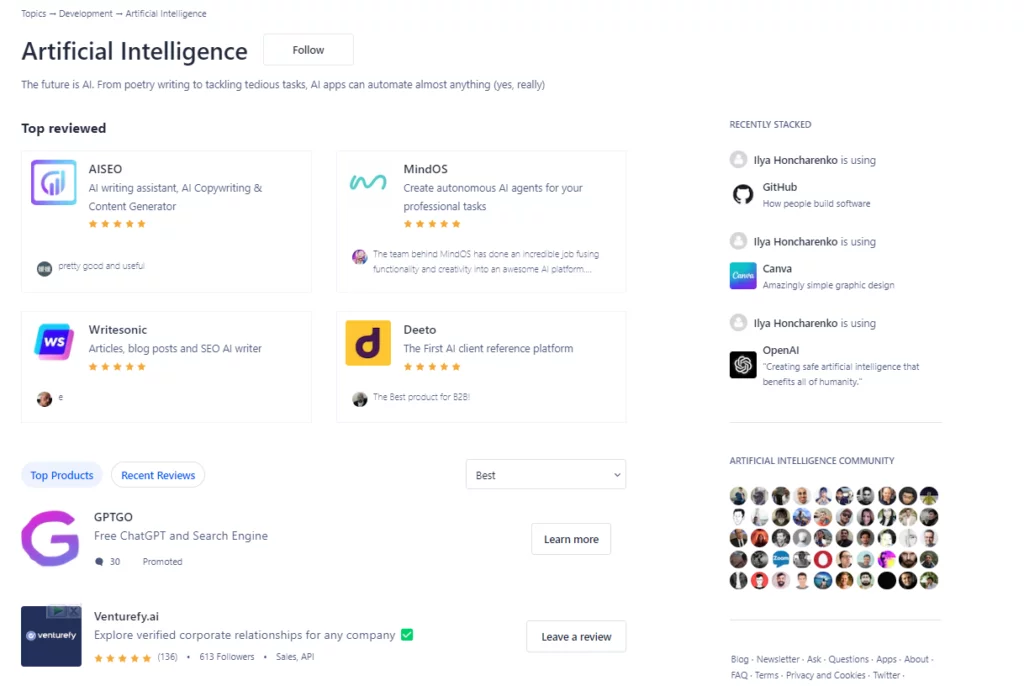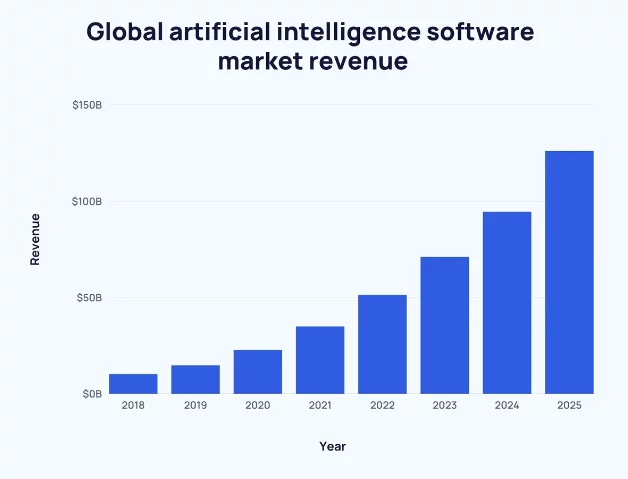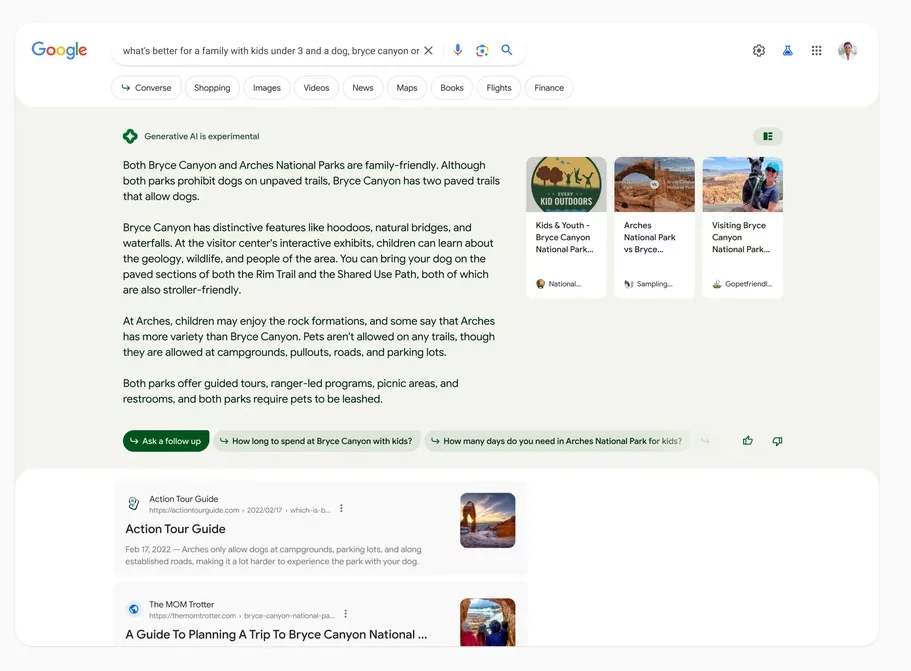Whether embraced or not, the pervasive presence of artificial intelligence (AI) is undeniable, as it continues to establish dominance across various industries. Search engine optimization (SEO) is no exception, as AI holds the potential to revolutionize workflows for businesses operating in this field.
Notably, the global rate of AI adoption has experienced a remarkable surge of 35%, exhibiting a 4-point increase compared to the previous year. As of mid-2023, the market offers an extensive selection of over 1000 AI tools, encompassing plugins, web-based utilities, scripts, AI voice generators, text-to-image and text-to-video converters, and numerous other applications.
The current utilization of AI and SEO tools is primarily focused on automating tasks, such as enhancing keyword research, optimizing content, generating lengthy tables, and crafting intricate data-driven articles.
However, the fundamental question remains the same: How can one effectively harness these tools to optimize their work processes and amplify productivity?
Because remember what Naval said – AI will replace the people who think it will.
AI will replace the people who think it will.
— Naval (@naval) December 13, 2022
AI is a powerful tool, if you won’t use it, then those who use it will eventually replace you, So much so that AI is redefining the way organizations approach SEO tactics, assisting them in navigating the ever-changing digital terrain with accuracy and speed, thanks to advances in natural language processing, machine learning, and, most recently, generative AI technology.
In this article, we’ll delve into AI and SEO, their strategy, AI highlights, some prompts, and how SEO is going to change because of AI.
What is AI and SEO?
AI and SEO, short for artificial intelligence and search engine optimization, refer to the utilization of artificial intelligence (AI) techniques to enhance the search engine ranking of a website or web page. By leveraging AI, various aspects of SEO can be automated, including tasks like keyword research, backlink analysis, and content optimization. Moreover, AI can enable personalized search results tailored to individual users and facilitate a more accurate understanding of user intent.
Presently, AI is employed in SEO through several methods:
- Keyword research: AI analyzes search patterns, identifies long-tail keywords, and predicts the potential success of specific keywords.
- Content optimization: AI examines content to identify relevant keywords, detects areas for improvement, and provides suggestions for enhancing search rankings.
- Personalized search results: AI personalizes search outcomes based on factors such as a user’s location, search history, and interests.
- Understanding user intent: AI aids in comprehending user intent more accurately, enabling SEO professionals to optimize content to meet the specific needs of their target audience.
- Creating engaging content: AI supports the creation of captivating content that is more likely to be shared and linked, leading to increased traffic and improved search rankings.
- Combating spam and low-quality content: AI assists in the identification and removal of spam and low-quality content from search results, ultimately enhancing the overall quality of search outcomes and making it easier for users to find high-quality content.
AI is not all perfect (For now)
You can rely on AI for math, creating creative content, checking spelling and grammar, Codes, and sometimes facts. The reason I say ‘sometimes’ facts is because AI (ChatGPT or Bard) can hallucinate about their data and facts. When it comes to historical data or any sort of statistical data, these chatbots make their own data rather than fact-checking.
This is especially true in ChatGPT-3.5 because it only has access to the information until 2021; after that, ChatGPT only knows the current date. On the other hand, ChatGPT-4 has access to the internet via a plugin. Plugins are especially useful when you want current news, weather, facts, and many more things.
As for Bard, It gives a good set of suggestions on AI and SEO, creating creative content, fact-checking information, and generating codes. But Bard also has many flaws, such as inaccurate data, facts, and stats that don’t exist.
What does this imply for us? It signifies the importance of exercising caution when obtaining information from AI chatbots. We should always verify the information obtained before utilizing it. Additionally, we must remain cognizant of the limitations of AI chatbots. Despite their remarkable capabilities, they are not infallible and may occasionally generate errors.
Nevertheless, despite these limitations, AI chatbots remain powerful tools that can aid in learning, productivity enhancement, and creativity. It is imperative to utilize them wisely and be mindful of their limitations at all times.
Market Insights
The current market is indeed experiencing a significant surge in AI tools, with an influx of more than 50 new AI tools emerging each week. This abundance of options can make it challenging to discern the best-suited tool for specific use cases.
A quick exploration of ProductHunt AI products reveals the vast array of tools available, ranging from generating poetry to handling accounting tasks, showcasing the versatility of AI’s capabilities.

AI and SEO are closely interconnected when it comes to content creation. Many AI tools aim to grab the attention of SEO enthusiasts, given the perpetual nature of SEO activities. As you browse through AI tools, you’ll realize that many of them concentrate on areas such as writing assistance, copywriting, content creation, keyword research, and content automation, among others.
Among the top contenders for choosing the right AI tool are ChatGPT 3.5 and 4, as well as Bard. These cutting-edge AI solutions offer competitive features and functionalities.
The growth trajectory of the AI software market is highly promising, with projected revenues reaching a substantial $126 billion by the end of 2026. This rapid expansion comes as no surprise, given the immeasurable potential AI holds to transform various industries, including AI and SEO.

As the AI landscape continues to evolve, it may lead to job disruptions in the AI and SEO sectors. However, it also presents new opportunities and possibilities for innovation and efficiency. The future promises exciting developments as AI continues to revolutionize various aspects of our lives. If you want to stay at the top of AI and SEO games then you should learn ‘How to use these tools’ and ‘How to operate these tools’ if not you’ll fall behind.
AI Tools to use for SEO 2023
Use these AI and SEO tools to drive traffic to your website, and don’t forget to Let AI breathe life into your website, not just automation.
- Semrush: A widely-used SEO tool providing comprehensive features for keyword research, backlink analysis, and website traffic insights.
- Ahrefs: Another popular SEO tool with similar capabilities to Semrush.
- Majestic: An AI-driven backlink analysis tool that offers insights into website backlink profiles.
- MarketMuse: An AI-powered content analysis tool helping businesses create high-quality and search engine optimized content.
- Surfer SEO: An AI-based SEO tool enabling content optimization for better search engine visibility.
- Frase: An AI-driven content research and writing tool to assist in creating high-quality, SEO-friendly content.
- INK: An AI writing tool that aids in crafting clear, concise, and engaging content optimized for search engines.
- Jasper AI: An AI writing assistant facilitating content creation for various platforms like blogs, emails, and social media posts.
- Scalenut: An AI-powered content optimization tool to enhance content quality and SEO.
- Outranking: An AI-based SEO tool for identifying and resolving SEO issues on your website.
- Serpstat: An AI-driven SEO tool for tracking website rankings, competitor analysis, and keyword research.
- DeepCrawl: An SEO crawler utilizing AI to analyze website technical SEO and identify potential issues.
- CognitiveSEO: An AI-based SEO tool for improving website visibility in search engines.
- SEOClarity: An AI tool to understand website SEO performance and discover areas for enhancement.
- Moz: An SEO tool offering various features for keyword research, backlink analysis, and website audits.
- KWFinder: An AI-driven SEO tool to discover high-volume, low-competition keywords.
- LongtailPro: An SEO tool for finding less competitive long-tail keywords with better conversion rates.
- AnswerThePublic: An AI tool for identifying common questions people ask about products or services.
- Yoast SEO: A popular WordPress plugin for optimizing websites for search engines.
- The SEO Framework: Another popular WordPress plugin for optimizing websites for search engines.
- Alli AI: An AI-driven SEO tool for improving website content, backlinks, and technical SEO.
- NeuronWriter: An AI writing tool for creating high-quality content optimized for search engines.
- Wand AI: A self-service AI platform with a no-code approach, enabling seamless AI generation.
- Cohesive Al: A powerful AI editor for crafting captivating and enchanting content.
- GhostwryterAl: An AI writing assistant specially designed to enhance productivity in Google Docs.
- CastmagicAl: An AI-powered tool for effortlessly creating podcast content.
- WriteSonicAl: An SEO-optimized content creator that delivers content 10 times faster.
- SimplifiedAl: An AI writer catering to various content needs, including blogs, advertisements, and websites.
- HypotenuseAl: An AI tool proficient in creating unique and engaging copywriting and visual content.
- MurfAl: An AI-powered tool for generating professional studio-quality voice overs from written text.
Now let’s look at some AI prompts, so you can use AI at its fullest potential.
Learn more about top-performing AI SEO Tools here.
Enhance online presence using AI and SEO Prompts
You’ll love these ChatGPT prompts: article generation, keyword research, blog topic ideas, grammar checker, content Improvement, and copywriting. I’ve got it all covered.
Article generation
- As a seasoned content creator, develop an SEO-optimized blog post outline focusing on the topic of [X], intended for a [X] audience, maintaining an informative tone, and aiming for a length of 1500-2000 words.
- In your role as a content strategist, generate an outline for an SEO-optimized blog post that critically reviews and ranks various [X] tools or resources, catering to professionals in the [X] industry, adopting an objective tone, and aiming for a length of 1000-1500 words.
- Suppose you are a skilled writer specializing in [X] topics; create a comprehensive blog post outline highlighting the advantages and disadvantages of different [X] techniques, targeting [X] practitioners, maintaining an unbiased tone, and aiming for a desired length of 1500-2000 words.
Keyword Research
- Identify 10 SEO keywords related to [topic].
- Create a list of 10 SEO keywords related to the following product description [product description].
- Analyze the top 5 SEO keyword tactics for [subject].
Copywriter
- As an experienced copywriter, develop a script for a video advertisement promoting the advantages of adopting renewable energy solutions, targeting environmentally conscious consumers with an informative and persuasive tone, highlighting the cost savings and positive environmental impact.
- Suppose you’re a creative copywriter; write a script for a video advertisement showcasing the benefits of using eco-friendly cleaning products, targeting health-conscious consumers with a knowledgeable and appealing tone, emphasizing the effectiveness and safety of the products.
- Imagine yourself as a copywriter for a fashion brand; create a script for a video advertisement that highlights the advantages of sustainable and ethical fashion choices, targeting conscious consumers with an informative and persuasive tone, emphasizing the positive impact on workers and the environment.
- To make [text] more worthy and pertinent for [target audience], improve [text].
- Use the term [keyword] to rewrite the text, bifurcating it into headings and subheadings to make it simpler to read.
- Make this [text] more legible for [target audience] in the context of [keyword] by making use of active voice and concise phrases.
- Add a call-to-action (CTA) to this text to persuade buyers to perform a peculiar action, such as subscribing to a newsletter or making a purchase.
AI in SEO: Looking ahead in Google’s new AI search engine
The integration and use of artificial intelligence (AI) in SEO is rapidly gaining momentum as businesses strive to gain a competitive advantage in the dynamic features of search engines. AI offers the potential to automate tasks, analyze data, and generate content that is highly optimized for search engine ranking.
One particularly noteworthy advancement is the emergence of Google’s new search engine generative AI. This AI technology is capable of producing text that closely resembles human-written content. Consequently, businesses now have the opportunity to leverage AI to generate high-quality, search engine-optimized content without relying solely on human writers.
While AI’s role in SEO is still in its newest stages, it holds immense potential to revolutionize how businesses approach and execute SEO strategies. As AI technology continues to advance, we can anticipate the emergence of even more powerful and sophisticated AI-driven SEO tools. These tools will assist businesses in enhancing their search engine rankings and achieving their broader business objectives. The future of AI and SEO looks promising as it continues to evolve and reshape the digital landscape.

Advantages:
- Generates human-quality text: AI is capable of producing content that closely resembles human-written text, allowing businesses to create high-quality, search engine-optimized content without relying on human writers.
- Saves time and money: AI can automate tasks like keyword research and content optimization, saving businesses valuable time and resources. These resources can then be allocated to other areas of the business.
- Improves search engine rankings: AI-generated content often exhibits higher engagement and informational value, leading to improved search engine rankings compared to human-written content.
Disadvantages:
- Potential bias: AI models are trained on vast datasets that may contain biases, which can result in biased AI-generated content. This can have negative consequences and perpetuate societal biases if not addressed and monitored carefully.
- Risk of fake content: AI can be used to create fake content, including false news articles or social media posts. This poses a risk of deceiving people and spreading misinformation, which can have significant societal implications.
- Difficulty in understanding: AI-generated content may sometimes lack clarity and understanding as it may not adhere to the same grammatical or syntactical rules as human-written content. This can make it challenging for readers to comprehend or trust the information presented.
Conclusion
The integration of AI and SEO has transformed the digital landscape, empowering businesses to achieve remarkable online success. AI-driven technologies enable enhanced website visibility, personalized user experiences, and data-driven decision-making. By embracing AI and SEO strategies, businesses can navigate the ever-evolving digital landscape with confidence and unlock new opportunities for growth.
FAQs on AI and SEO
Can AI completely replace traditional SEO practices?
No, AI complements traditional SEO practices and enhances their effectiveness. While AI can automate certain tasks and provide valuable insights, the strategic application of Ai and SEO practices remains essential for long-term success.
Will AI-powered SEO strategies guarantee top search rankings?
AI-powered SEO strategies can significantly improve search rankings and visibility. However, search engine algorithms consider numerous factors, and competition is fierce. Success in AI and SEO requires a comprehensive approach that incorporates both AI-driven techniques and traditional SEO best practices.
How can AI help optimize content for voice search?
AI algorithms analyze natural language patterns and voice-based queries to understand user intent. By incorporating relevant keywords and phrases into content and optimizing for conversational queries, businesses can improve their visibility in voice search results.
How does AI impact keyword research in SEO?
AI and SEO -powered keyword research tools analyze vast amounts of data, identify relevant keywords, and provide insights into search volume, competition, and user intent. This helps marketers optimize their content and improve search engine rankings.
Can AI improve user experience on websites?
Yes, AI enhances user experience by enabling instant responses through chatbots and virtual assistants, analyzing user behavior for personalized experiences, and delivering relevant recommendations based on preferences.
What are the challenges of implementing AI in SEO?
Challenges include biased or inaccurate results due to historical data reliance, the complexity of AI algorithms requiring expertise and resources, and the need for continuous updates to stay relevant.



